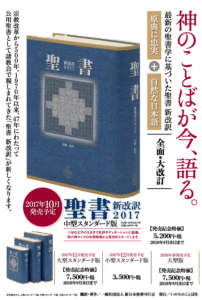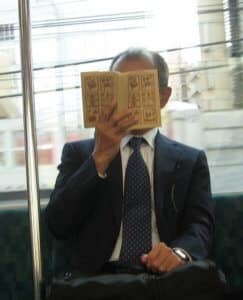 “The nail that sticks up gets whacked down,” warns the Japanese proverb. Cultural pressures to conform make it difficult for people to convert to Christianity and to live a Christian lifestyle. But publishers there are taking advantage of Japan’s 99% literacy rate and appreciation of books to create powerful tools to reach society and nurture believers. Ramon Rocha, our director of publisher development, talked with multiple Christian publishers in Tokyo this November 6 to 10 to explore how MAI might help or encourage. He shares observations here:
“The nail that sticks up gets whacked down,” warns the Japanese proverb. Cultural pressures to conform make it difficult for people to convert to Christianity and to live a Christian lifestyle. But publishers there are taking advantage of Japan’s 99% literacy rate and appreciation of books to create powerful tools to reach society and nurture believers. Ramon Rocha, our director of publisher development, talked with multiple Christian publishers in Tokyo this November 6 to 10 to explore how MAI might help or encourage. He shares observations here:
Q: What excited you about how Japanese publishers are reaching new readers and building the Church?

I sensed the determination and perseverance of Japanese publishers to reach 99% of the population, difficult as it is. (Japan is only 1.5% Christian.) “I want to share the joy of salvation to as many Japanese readers as possible,” said Mr. Hiroyuki Homori of E-Grape Publishing House. He has specialized in books of testimonies of prominent businessmen, educators and medical doctors. “For people to listen to the gospel, they need to see how it works in the lives of trustworthy and reputable people.”
An impressive 80 percent of Word of Life Press Ministries’ (WLPM) 2017 titles are by Japanese authors—a stat similar to Yobel and E-Grape. WLPM’s weekly newspaper (10,000 circulation), monthly tabloid-size gospel tract (2 million copies annually), full-color monthly magazine (25,000 copies), and books under Forest Books, its imprint for general readers.
WLPM’s latest big project was the launch of a completely revised Bible translation called “New Japanese Bible 2017.” Scholars spent five years translating from original Greek and Hebrew. In one month, 20,000 copies were sold.
Japanese manga comics are used widely, not only to reach children and youth but even adults. Overall Christian publishing is very much alive and vibrant, ministering both to believers and unbelievers.

Q: Did you learn of any creative examples of evangelistic literature?
OneHope Japan published a uniquely Japanese booklet for youth called Hope Novi. “Most if not all of the available Japanese Bible translations were too formal, geared toward adults in a church setting, and not very understandable to the average Japanese youth. So, we ‘re-paraphrased’ Scripture passages for this booklet and we received positive feedback from unbelievers,” said Hisho Uga, OneHope Japan’s National Director.
Storytelling in public places is very Japanese, so OneHope partnered with WLPM to produce the Kamishibai box project. OT and NT stories (one box of each) are accompanied by colorful storyboards with script on the back of each card. Churches purchase these boxes, and volunteers gather children in a local park and start telling Bible stories. The 2,000 boxed sets each of OT and NT have almost sold out since launching early this year.
Q: What are the top challenges for Japanese publishers and authors?
 To become a Christian is to be different from the rest. The Japanese psyche wants to belong, not to stand out in a crowd. People are afraid to be labeled as outcasts. “Now we say, ‘To believe in Jesus is wonderful! There’s nothing like it!’ said Mr. Shinichi Iwamoto, president of WLPM.
To become a Christian is to be different from the rest. The Japanese psyche wants to belong, not to stand out in a crowd. People are afraid to be labeled as outcasts. “Now we say, ‘To believe in Jesus is wonderful! There’s nothing like it!’ said Mr. Shinichi Iwamoto, president of WLPM.
Japanese people are generally prosperous. Although a high suicide rate indicates emptiness and dissatisfaction with life, people do not immediately see the need for the Savior. Publishers and authors face the challenge of presenting the Gospel in fresh and attractive ways.
The Christian market is small. Low prices of Christian books make it hard for publishers to be financially sustainable. Quality standards are so high, books must be packaged excellently, which drives up costs.
Q: Japan is known as a high-tech society. How are Japanese publishers harnessing the power of technology to reach society?
Printed materials are still the preferred mode of content consumption. But publishers are using videos, films, DVDs , CDs, ebooks, apps, radio, even occasional TV shows like “Super Book,” an animated cartoon series that airs this Christmas season on both local and national TV. The Japanese version of Bible App for Kids is getting 3,000 downloads a month, 100/day.
, CDs, ebooks, apps, radio, even occasional TV shows like “Super Book,” an animated cartoon series that airs this Christmas season on both local and national TV. The Japanese version of Bible App for Kids is getting 3,000 downloads a month, 100/day.
Q: How can we pray for publishers and writers in Japan?
Pray for wisdom, strength and perseverance for Japanese publishers and writers, that they will continue to publish life-transforming, culturally relevant materials, especially to reach the 99 percent.

